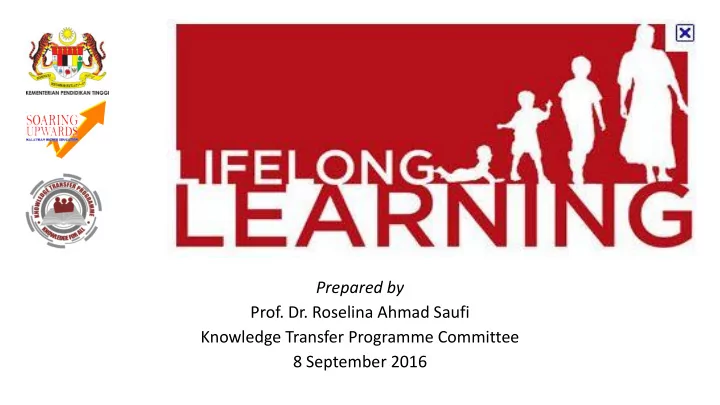

ONG LEARNING Prepared by Prof. Dr. Roselina Ahmad Saufi Knowledge Transfer Programme Committee 8 September 2016
THE CONCEPT OF LEARNING
THE CONCEPT (c (cont.) • Learning can no longer be divided into a place and time to acquire knowledge (school). • Learning can also no longer be divided into a place and time to apply the knowledge acquired (the workplace). • Learning can take place on an ongoing basis from daily interactions with others and with the world around us. In the form of formal learning or informal learning, or self-directed learning.
THE CONCEPT (c (cont.) • A learning approach that can be used to define lifelong learning is heutagogy. • In education, heutagogy , is a term coined by Stewart Hase and Chris Kenyon of Southern Cross University in Australia, and is also called self-determined learning. • The basic tenet of the approach states that a learner should be at the centre of his or her own learning, and, hence, that 'learning' should not be seen as teacher- or curriculum- centric, but learner-centric.
We must recognise lifelong learning ‘from cradle to grave’ as a key factor for growth, jobs and social inclusion.
LIFE LONG LEARNING IS… • The development of human (organisations) potential through a continuously supportive process which stimulates and empowers individuals to acquire all the knowledge, values, skills and understanding they will require throughout their lifetimes and to apply them with confidence, creativity and enjoyment in all roles, circumstances and environments (Longworth and Davies, 1996) • Lifelong learning is the "ongoing, voluntary, and self-motivated" pursuit of knowledge for either personal or professional reasons. • Lifelong learning is about creating and maintaining a positive attitude to learning both for personal and professional development.
• It is what people do when they want to make sense of the world. • It may involve an increase in skills, knowledge, understanding, values or the capacity to reflect. • Effective learning will lead to change, development and a desire to learn more.
Why is lifelong learning important? L C where L is Learning and C is Change Applies to society, communities, organisations and individuals. ( Roddie Shepherd, 2013)
TYPES OF LIF IFE LONG LEARNING • Home schooling involves learning to learn or the development of informal learning patterns • Adult education or the acquisition of formal qualifications or work and leisure skills later in life • Continuing education which often describes extension or not-for- credit courses offered by higher education institutions • Knowledge work which includes professional development and on- the-job training • Personal learning environments or self-directed learning using a range of sources and tools including online applications
MODES OF LEARNING Formal school, university, institutions Specific and structured programme Training & Development LLL Informal – home, Programme personal tutoring • For specific purpose Self directed learning • computer instruction, manual
IN IN THE CONTEXT OF KNOWLEDGE TRANSFER… from is issues to methods to process to outcomes… for CAPACITY BUILDING.
THE SCOPE INDUSTRIES/SMEs COMMUNITIES EDUCATORS and LEARNERS
Within these 6 National Key Areas (NKEA) Environment & Food security Cyber security Climate Change Medical & Energy security Water security Healthcare
THE KT PROJECT MUST REFLECT… MODULES ISSUES? TARGETED METHODS MEASURES OF AIM knowledge to Targeted at capacity OUTCOMES OF EFFECTIVENESS building through (Matlamat) be impart (Target yang (outcomes) knowledge, skills, DELIVERY competencies and learning (ilmu yang (ukuran akan (Kaedah behavioural hendak keberkesanan) outcomes enhancement in Penyampaian) dihasilkan) order to solve the disampaikan) partner’s problem/requirement
THE OUTCOME INDICATORS BEFORE KTP AFTER KTP Business/ Individual Community Performance Performance
THE IM IMPACT … from Capacity Building to… Business improvement, sustainability and improved quality of life.
THANK YOU
Recommend
More recommend